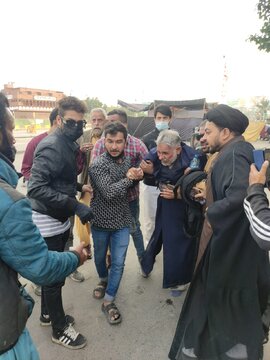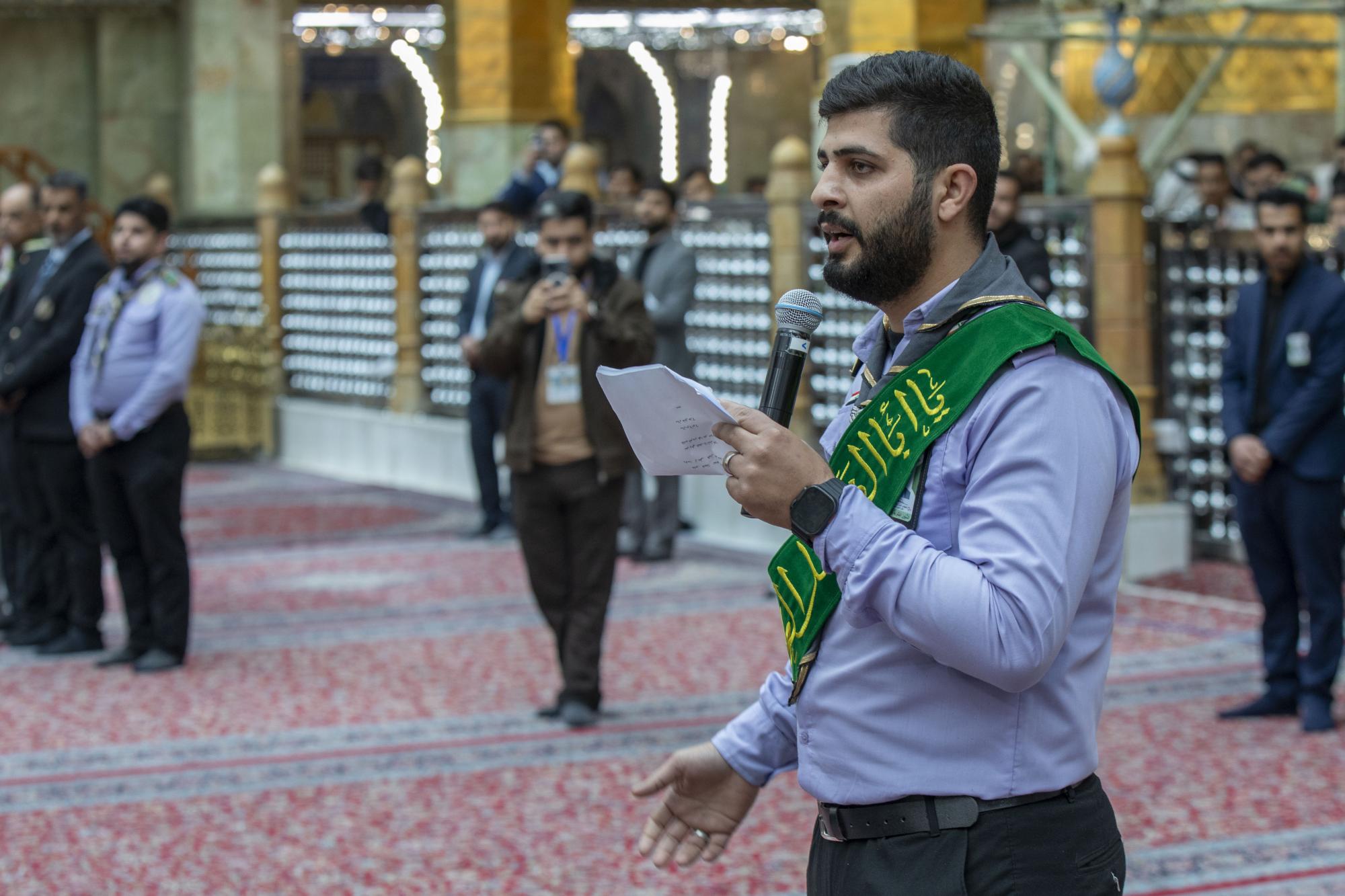Hazrat Fatimah al - Zahra’s (S.A.) Characteristics
By: Baqir Shareef al-Qurashi
Fatimah
az-Zahra’ (s.a.) was different from all women in her high qualities and
noble characteristics that took her to the highest rank of virtue and
perfection. She was an example of her father’s morals and mentality. She
resembled him in his deep faith in Allah the Almighty, asceticism, and
refraining from pleasures of this life. Here, we talk about some of
Fatimah’s characteristics:
Infallibility
Fatimah (s.a.) was infallible, and this is an indisputable fact. Allah
had purified her from every sin and every defect, and endowed her with
all virtues to make her an example for all the women of the world. She
was an ideal example in faith, worship, chastity, purity, charity, and
kindness to the poor and the deprived.
Proofs on her infallibility
1. The verse of purification; Allah has said, “Allah only desires to
keep away the uncleanness from you, O people of the House, and to purify
you a (thorough) purifying.” 33:33
The People of the House (the Ahlul Bayt) were Ali, Fatimah, al-Hasan and al-Husayn (a.s.).1
The verse clearly proves the infallibility and purity of these persons
from every sin and vices. Allah had chosen these people to be examples
for His people and guides to His obedience and pleasure. It is
impossible for Allah to give sinners or guilty people this gift.
Infallibility, in its concept, definitely would not be far from the
Ahlul Bayt (a.s.) who were the centers of knowledge and wisdom in Islam.
For forty years, I have researched and written books on them, but I
could find a slip neither in their sayings nor in their doings. Even
their enemies, who were full of grudge against them, did not mention any
fault or any bit of deviation about them.
Imam Ali (a.s.) says,
‘By Allah, if I am given the seven districts with all that under their
skies to disobey Allah in a bran of a grain of barley that I deprive it
of a mouth of a locust, I will never do.’
This far extent of
piety in the imams is the very infallibility that the Shia believe to be
in their imams. Anyhow, Fatimah (s.a.) was one of the fourteen
infallible members of the Ahlul Bayt (a.s.).
2. The Prophet (S)
made all his nation, through his repeated sayings, know that Fatimah
(s.a.) was a part from him, and that whatever pleased her would please
him and whatever displeased her would displease him. That she was a part
from the Prophet (S) means that she was infallible since the Prophet
(S) was infallible.
3. The true traditions that were transmitted
from the Prophet (S) confirmed that Allah would be pleased with the
pleasure of Fatimah (s.a.) and would be displeased with her displeasure.
These traditions mean that Fatimah (s.a.) had reached a degree of faith
and piety that would take her to the same rank of the infallible
prophets who sincerely obeyed Allah and knew Him as He was.
4.
The Prophet (S) compared his progeny to the Book of Allah as in the
mutawatir (successive) tradition of “ath-Thaqalayn”, and since the Book
of Allah is infallible from any falseness, so are the Ahlul Bayt (a.s.);
otherwise, the Prophet (S) would not compare them to the Book of Allah.
Fatimah (s.a.) was at the head of the pure progeny of the Prophet (S)
and was the mother of all the infallible imams (except Imam Ali) whom
Allah had purified from all uncleanness.
Charity to the Poor
Fatimah (s.a.) was charitable and too kind to the poor and the
deprived. She, her husband,and her two sons were meant by these Qur’anic
verses, “And they give food out of love for Him to the poor, the
orphan, and the captive. We only feed you for Allah’s sake; we desire
from you neither reward nor thanks.” 76:8-9
Fatimah (s.a.)
milled wheat and barley for her poor neighbors who were unable to do
that. She carried water to her weak neighbors who could not get water.
On the night of her wedding, Fatimah (s.a.) had a new dress on. When
she knew that a young woman from the Ansar2 could not find a dress to
put on, she took off her wedding dress and gave it to that young woman.
Fatimah (s.a.) turned away from every material pleasure and preferred
the satisfaction of Allah to everything. Jabir bin Abdullah al-Ansari
said,‘Once, the messenger of Allah (S) led us in offering the Asr
(afternoon) Prayer, and when he offered the nafila (a supererogatory
prayer), he sat in the qibla and people sat around him. A very old man
came complaining of hunger and saying, ‘O prophet of Allah, I am hungry.
Feed me! And I am naked (have no clothes). Clothe me!’. The Prophet (S)
asked the old man to go to the house of his (the Prophet) daughter
Fatimah (s.a.). The old nomad man went to Fatimah’s house and from
behind the door he greeted her and said, ‘O daughter of Muhammad, I am
naked and hungry. Would you please comfort me, may Allah have mercy on
you?’
Fatimah (s.a.) herself was in neediness, and she found
nothing to give to the man except a sheepskin that her sons al-Hasan and
al-Husayn slept on. The old man did not like it and he gave it back to
her. Then, Fatimah (s.a.) took a necklace, which was a present from her
cousin Fatimah bint Hamza bin Abdul Muttalib, off her neck and gave it
to the man.
The old man took the necklace and went back to the
Prophet (S) saying to him, ‘Fatimah gave me this necklace and said to
me, ‘Sell it! May Allah recompense you with good for it.’
The
Prophet (S) cried and said, ‘And how does Allah not recompense you with
good for it while the daughter of Muhammad, the principal of the
daughters of Adam, has given it to you?’
Ammar bin Yasir asked the Prophet (S), ‘O messenger of Allah, do you permit me to buy this necklace?’
The Prophet (S) said, ‘Buy it, Ammar! If the human beings and the jinn
participate in it, Allah will not punish them with Fire.’
Ammar said, ‘O Sheikh (old man), how much is the necklace?’
The old man said, ‘I sell it for a meal of bread and meat, a Yemeni
garment that I cover my private parts and offer prayer for my Lord with,
and a dinar that takes me to my family.’
Ammar said to him, ‘I
give you twenty dinars, two hundred dirhams, a Yemeni garment, my camel
to take you to your family, and a meal of wheat bread and meat.’
The old man said, ‘O man, how generous you are!’ He left delightedly
saying, ‘O Allah, there is no god but You. O Allah, give Fatimah what no
eye has ever seen and no ear has ever heard of.’
Ammar perfumed
the necklace with musk, enveloped it in Yemeni garment, and gave it one
of his slaves saying to him, ‘Take this necklace to the messenger of
Allah (S) and you will be his.’
When the slave took the necklace
to the Prophet (S), the Prophet (S) asked him to take it to Fatimah
(s.a.) who took it and set the slave free.
The slave smiled.
Fatimah (s.a.) asked him what made him smile and he said, ‘What made me
smile was the great blessing of this necklace.
It satiated a hungry one, clothed a naked one, made a poor one rich, freed a slave, and then returned to its owner.’3
Asceticism
Fatimah (s.a.) led an ascetical life, and lived in satisfaction away
from the worldly pleasures like her father the Prophet (S) and her
husband Imam Ali (a.s.) who had divorced this world and been abstinent
from its pleasures.
When these verses, “And surely Hell is the
promised place of them all. It has seven gates; for every gate there
shall be a separate party of them.” 15:43-44
Were revealed to
the Prophet (S), he cried too much and his companions cried for his
crying though they did not know why he cried. One of the companions went
to Fatimah (s.a.) who was milling barley and reciting, “And whatever is
with Allah is better and more lasting.” 28:60
He greeted and told
her about the crying of her father. She wrapped herself with a ragged
cloak that was sewed with palm-tree leaves and went to the meeting of
her father. When Salman saw her, he said, ‘How sorrowful! The daughters
of Caesar and Khosrau are in sarcenet while the daughter of the
messenger of Allah wears a ragged wool cloak.’
Fatimah (s.a.)
came to the Prophet (S) and told him what Salman said, and then she
said, ‘By Him Who has sent you with the truth, I and Ali since five
years have nothing but a sheepskin. We give food on it to our camel in
the day and in the night we sleep on it, and our pillow is from leather
filled with palm-tree fibers.’ Then she asked her father about the
reason of his crying and he told her about the revelation of those
verses. She said, Woe and woe unto whoever enters Fire.’4
Anas
bin Malik said, ‘Once, Fatimah came to the Prophet (S) and said, ‘O
messenger of Allah, I and Ibn Abi Talib (Imam Ali) have no bed except a
sheepskin. We sleep on it, and give food to our camel on it in the day.’
The Prophet (S) said to her, ‘My daughter, be patient! Moses son of
Imran lived with his wife for ten years and she had no bed except an
aba.’5
Jabir bin Abdullah al-Ansari said, ‘Once, the Prophet (S)
saw his daughter Fatimah in a ragged garment while milling with her
hand and suckling her child. His eyes shed tears and he said, ‘O my
daughter, bear the bitterness of this life for the sake of the sweetness
of the afterlife…’
She declared her satisfaction by saying, ‘Praise be to Allah for His favors and thanks to Him for His blessings…’6
Fatimah (s.a.) lived a very simple life with no pleasures or any kind
of luxury. In her conducts, she showed the real picture of Islam and
gave Muslim woman lessons of satisfaction with what Allah had determined
for man.
Fatimah (s.a.) abstained from all desires of life in
food, clothes, and others and she turned sincerely to Allah and
preferred pleasing Him to everything else.
Chastity and Veiling
Fatimah (s.a.) was the highest example in chastity, honor and veiling for all Muslim women.
Imam Ali (a.s.) said, ‘Once, a blind man asked permission to visit
Fatimah (s.a.), but she asked him to stay behind a screen. The messenger
of Allah (S) asked Fatimah (s.a.), ‘Why did you screen him though he is
blind and could not see you?’
She said, ‘He could not see me, but I could see him.’
The Prophet (S) said, ‘I witness that you are a part from me.’7
Once, Imam Ali (a.s.) asked Fatimah (s.a.), ‘When is woman closer to her Lord?’
She said, ‘When she keeps to her house…’
Imam Ali (a.s.) offered her answer to the Prophet (S) who said, ‘She is true. Fatimah is a part from me.’8
Veil is beauty and honor for woman. Whenever woman adorns herself with
chastity, she will be in a highest position and most honorable rank
besides gaining admiration of them all. But if woman is unveiled and
unchaste, she will be worthless in the society and no one will
appreciate her. The veil and chastity of Fatimah (s.a.) is a high
example that every woman who wants to live regardable and honorable in
the society.
Deep Faith
Definitely, no one can suspect the unequaled faith and worship of
Fatimah (s.a.). She spent most of her days and nights in worshipping.
Imam al-Hasan (a.s.) said, ‘Some night, I saw my mother Fatimah (s.a.)
in her mihrab bow and prostrate (offer prayers) until the light of
morning appeared. I heard her praying to Allah for the believing men and
the believing women and mentioning them by name. She prayed to Allah
for them too much, but without praying for herself. I said to her, ‘Why
do you not pray to Allah for yourself mother?’
She said, ‘O my son, the neighbor (first) and then the house…’9
Al-Hasan al-Basri said about Fatimah (s.a.), ‘No one in the umma
worshipped Allah more than Fatimah (s.a.). She offered prayers in the
night until her feet swelled.’10
It was transmitted from Fatimah
(s.a.) her saying, ‘Whoever raises his true worship to Allah, Allah
will send down to him the best of his benefit.’11
Fatimah (s.a.)
assigned the last hours of the day of Fridays for Allah the Almighty.
In the last ten days of Ramadan, Fatimah (s.a.) spent all the night in
worshipping and supplicating, and she encouraged all those in her house
to spend the night in worshipping and supplicating.
Her feet swelled because of her long standing before Allah the Almighty.12
Devotedness
Fatimah (s.a.) devoted herself to Allah and resorted to Him totally in all of her affairs. This was clear in her du’as.
1. Tafsir of ar-Razi, vol.6 p.783, Tafsir of ibn Jarir, Musnad of Ahmed
bin Hanbal, vol.4 p.107, Sunan of al-Bayhaqi, vol.2 p.14, al-Khasa’iss
of an-Nassa’iy, p.33, al-Khasa’iss al-Kubra, vol.2 p.264, ar-Riyadh
an-Nadhirah, vol.2 p.188, Mushkil al-Aathar, vol.1 p.324.
2. Ansar means helpers; the people of Medina who believed and supported the Prophet (S) when he emigrated to Medina from Mecca.
3. Know that I am Fatimah, vol.9 p.266.
4. Know that I am Fatimah, vol.2 p.16.
5. Fatimah az-Zahra’ Bahjat Qalb al-Mustafa, p.274.
6. Safeenat al-Bihar, vol.1 p.571.
7. Bihar al-Anwar, vol.43 p.91.
8. Al-Ja’fariyyat, p.95.
9. Fee Rihab Ahlul Bayt, p.205.
10. Bihar al-Anwar, vol.43 p.84.
11. Ibid., vol.68 p.184.
12. Fatimah Ummu Abeeha, p.64.
/129





